
Russian President Vladimir Putin and German Chancellor Angela Merkel discussed by phone the potential for joint production of a coronavirus vaccine, the Kremlin said Tuesday.
Putin and Merkel discussed cooperation in the fight against Covid-19 “with an emphasis on potential prospects for the joint production of vaccines,” according to a statement on the Kremlin’s website.
The talks follow Putin’s admission last year that domestic equipment shortages could delay Russia’s Sputnik V vaccine from entering mass production. Reports also said Russia was struggling with production capacity issues and problems with scalability and quality control.
Alexander Gintsburg, the director of the state-run Gamaleya research center that developed Sputnik, on Tuesday said that over 1 million people in Russia have received the jab so far.
More than 50 countries have bought or agreed to localize production of over 1 billion Sputnik V doses, with initial batches arriving in Argentina, Serbia and Belarus. Hungary, which received 6,000 doses that have not yet received regulatory clearance, has said it could abstain from using Sputnik V due to limited production capacity for the vaccine.
Last month, Russian and German health ministers agreed to discuss the search for “production facilities” for the joint manufacture of Russian-made Covid-19 vaccines. Russia’s state-run TASS news agency reported that Berlin told Moscow it was ready “to involve German companies in joint production of Russian vaccines.”
Putin and Merkel agreed to maintain health ministry-level contacts on the joint production of a Covid-19 vaccine, the Kremlin said in Tuesday’s statement.
Both Russia and Germany have recently started mass vaccination drives at home to curb the spread of the coronavirus and avoid re-imposing nationwide lockdowns. Germany is using the vaccine jointly developed by Pfizer and the Mainz-based company BioNtech.
In another sign of recognition for the Sputnik jab that has been viewed with skepticism by the West, British-Swedish drugmaker AstraZeneca in December announced a clinical trial program that would use a combination of its vaccine and the Russian one.
Some critics have described it as a tool to bolster Russia’s geopolitical influence.
AFP contributed reporting.
